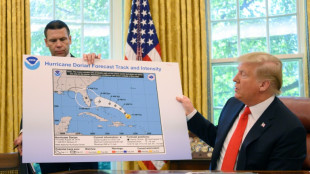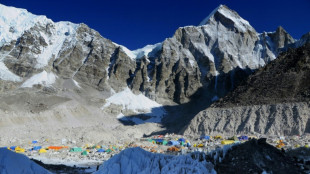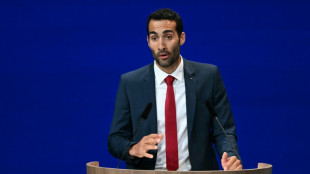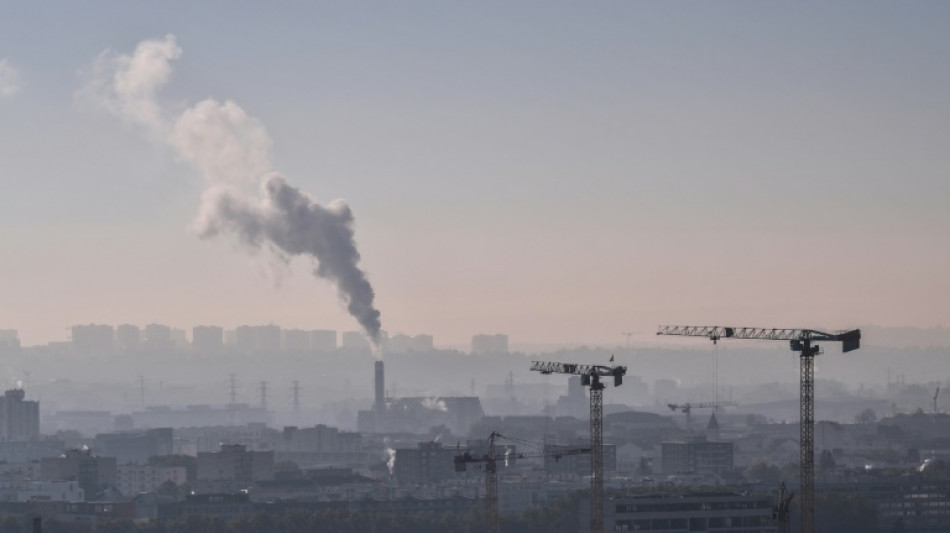
-
 Aga Khan: racehorse billionaire and Islamic spiritual leader
Aga Khan: racehorse billionaire and Islamic spiritual leader
-
China slams US 'suppression' as trade war deepens

-
 Sri Lanka's Karunaratne to bow out of Tests after 'fulfilling dream'
Sri Lanka's Karunaratne to bow out of Tests after 'fulfilling dream'
-
Philippine House votes to impeach VP Sara Duterte

-
 Tokyo police bust alleged prostitution ring targeting tourists
Tokyo police bust alleged prostitution ring targeting tourists
-
Baltics to cut Soviet-era ties to Russian power grid

-
 Iraq's famed 'hunchback' of Mosul rebuilt brick by brick
Iraq's famed 'hunchback' of Mosul rebuilt brick by brick
-
Stock markets stutter as traders weigh China-US trade flare-up

-
 Hamas rejects Trump proposal to take over Gaza, move Palestinians
Hamas rejects Trump proposal to take over Gaza, move Palestinians
-
MotoGP champion Martin taken to hospital after Malaysia crash

-
 YouTubers causing monkeys to attack tourists at Cambodia's Angkor Wat
YouTubers causing monkeys to attack tourists at Cambodia's Angkor Wat
-
Sweden reels from worst mass shooting in its history

-
 India's Modi takes ritual dip at Hindu mega-festival
India's Modi takes ritual dip at Hindu mega-festival
-
Nissan shares fall as reports say Honda merger talks off

-
 US Postal Service says suspending parcels from China
US Postal Service says suspending parcels from China
-
Toyota announces Lexus EV plant in Shanghai

-
 Santander reports record profit for third straight year
Santander reports record profit for third straight year
-
No new clothes: S. Korean climate activist targets hyperconsumption

-
 Cummins 'hugely unlikely' for Australia's Champions Trophy bid
Cummins 'hugely unlikely' for Australia's Champions Trophy bid
-
Nissan shares plunge as report says Honda merger talks off

-
 China holds out hope last-minute deal can avert US trade war
China holds out hope last-minute deal can avert US trade war
-
LeBron relishing 'special' Doncic double act

-
 Tatum shines as Celtics down Cavs, Lakers thrash Clippers
Tatum shines as Celtics down Cavs, Lakers thrash Clippers
-
Myanmar junta bid to sell Suu Kyi mansion flops for third time

-
 Australia bans DeepSeek AI program on government devices
Australia bans DeepSeek AI program on government devices
-
Olympics on horizon as China hosts Asian Winter Games

-
 Tatum, White shine as Celtics down Cavs
Tatum, White shine as Celtics down Cavs
-
Google pledge against using AI for weapons vanishes

-
 African football has the platform for historic World Cup success
African football has the platform for historic World Cup success
-
France prop Gros happy to go 'under radar' for Dupont's benefit

-
 Bove's future uncertain after heart attack horror as Fiorentina finish Inter clash
Bove's future uncertain after heart attack horror as Fiorentina finish Inter clash
-
Race against time to complete contested Milan-Cortina bobsleigh track

-
 Speed queen Goggia pursuing Olympic dreams with 2026 Winter Games on horizon
Speed queen Goggia pursuing Olympic dreams with 2026 Winter Games on horizon
-
Asian markets stutter as traders weigh China-US trade flare-up

-
 French PM set to survive no confidence vote
French PM set to survive no confidence vote
-
Trump says US will take over Gaza, create 'Riviera of the Middle East'

-
 Google shares slide on spending plans despite sales jump
Google shares slide on spending plans despite sales jump
-
Honda shares jump on reports it wants Nissan as subsidiary

-
 Trump says US will 'take over' Gaza as he welcomes Netanyahu
Trump says US will 'take over' Gaza as he welcomes Netanyahu
-
Netflix drops 'Emilia Perez' star Oscar bid over offensive posts: reports

-
 Sirianni embraces emotions ahead of Chiefs rematch
Sirianni embraces emotions ahead of Chiefs rematch
-
Top climate scientist declares 2C climate goal 'dead'
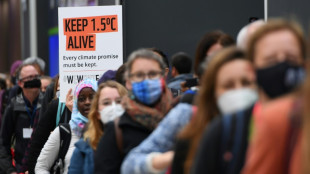
-
 US Treasury says Musk team has 'read-only' access to payments data
US Treasury says Musk team has 'read-only' access to payments data
-
Leaders 'should respect' wishes of Palestinians to stay in Gaza: Palestinian UN envoy

-
 Paris Saint-Germain, Brest, Dunkerque advance to French Cup last eight
Paris Saint-Germain, Brest, Dunkerque advance to French Cup last eight
-
Simeone brace helps Atletico thrash Getafe, reach Copa del Rey semis

-
 Trump hosts Netanyahu for pivotal Gaza ceasefire talks
Trump hosts Netanyahu for pivotal Gaza ceasefire talks
-
Atletico thrash Getafe to reach Copa del Rey semis

-
 Stocks recover but tariff uncertainty lingers over market
Stocks recover but tariff uncertainty lingers over market
-
Shiffrin to sit out world team combined, dashing Vonn hopes


Nearly entire global population breathing polluted air: WHO
A full 99 percent of people on Earth breathe air containing too many pollutants, the World Health Organization said Monday, blaming poor air quality for millions of deaths each year.
Fresh data from the UN health agency showed that every corner of the globe is dealing with air pollution, although the problem is much worse in poorer countries.
"Almost the entire global population (99 percent) breathes air that exceeds WHO air quality limits, and threatens their health," the agency said in a statement.
In its previous report four years ago, WHO had already found that over 90 percent of the global population was affected, but it has since tightened its limits, it said.
"The evidence base for the harm caused by air pollution has been growing rapidly and points to significant harm caused by even low levels of many air pollutants," WHO said.
While UN data last year indicated that pandemic lockdowns and travel restrictions caused short-lived improvements in air quality, WHO said air pollution remains a towering problem.
"After surviving a pandemic, it is unacceptable to still have seven million preventable deaths and countless preventable lost years of good health due to air pollution," Maria Neira, the head of the WHO's department of public health and environment, said in a statement.
WHO's study provides air quality data from more than 6,000 cities and towns across 117 countries.
The findings were alarming, the organisation said, and highlighted the importance of rapidly curbing fossil fuel use.
- 'Healthier energy systems' -
WHO chief Tedros Adhanom Ghebreyesus stressed that worries over soaring energy prices, due in part to Russia's invasion of Ukraine, should help propel change.
"Current energy concerns highlight the importance of speeding up the transition to cleaner, healthier energy systems," he said in a statement.
"High fossil fuel prices, energy security, and the urgency of addressing the twin health challenges of air pollution and climate change, underscore the pressing need to move faster towards a world that is much less dependent on fossil fuels."
The report provides data on concentrations of dangerous particulate matter with a diameter of between 2.5 and 10 micrometres (PM10), and particles with a diameter of less than 2.5 micrometres (PM2.5).
PM2.5 includes toxins like sulfate and black carbon, which pose the greatest health risks since they can penetrate deep into the lungs or cardiovascular system.
And for the first time, the report also provides ground measurements of annual mean concentrations of nitrogen dioxide (NO2), a common urban pollutant, which is associated with respiratory diseases, particularly asthma.
The report found problems related to particulate pollution were far worse in poorer countries, but that most cities had trouble with nitrogen dioxide.
While the air in 17 percent of cities in high-income countries fell below WHO's air quality guidelines for PM2.5 or PM10, less than one percent of cities in low and middle-income countries complied with the recommended thresholds, the report said.
Out of the around 4,000 cities across 74 countries that collected NO2 data, measurements meanwhile showed only 23 percent of people breathed annual average concentrations of the gas that met levels in WHO's recently updated guidelines.
J.Horn--BTB

